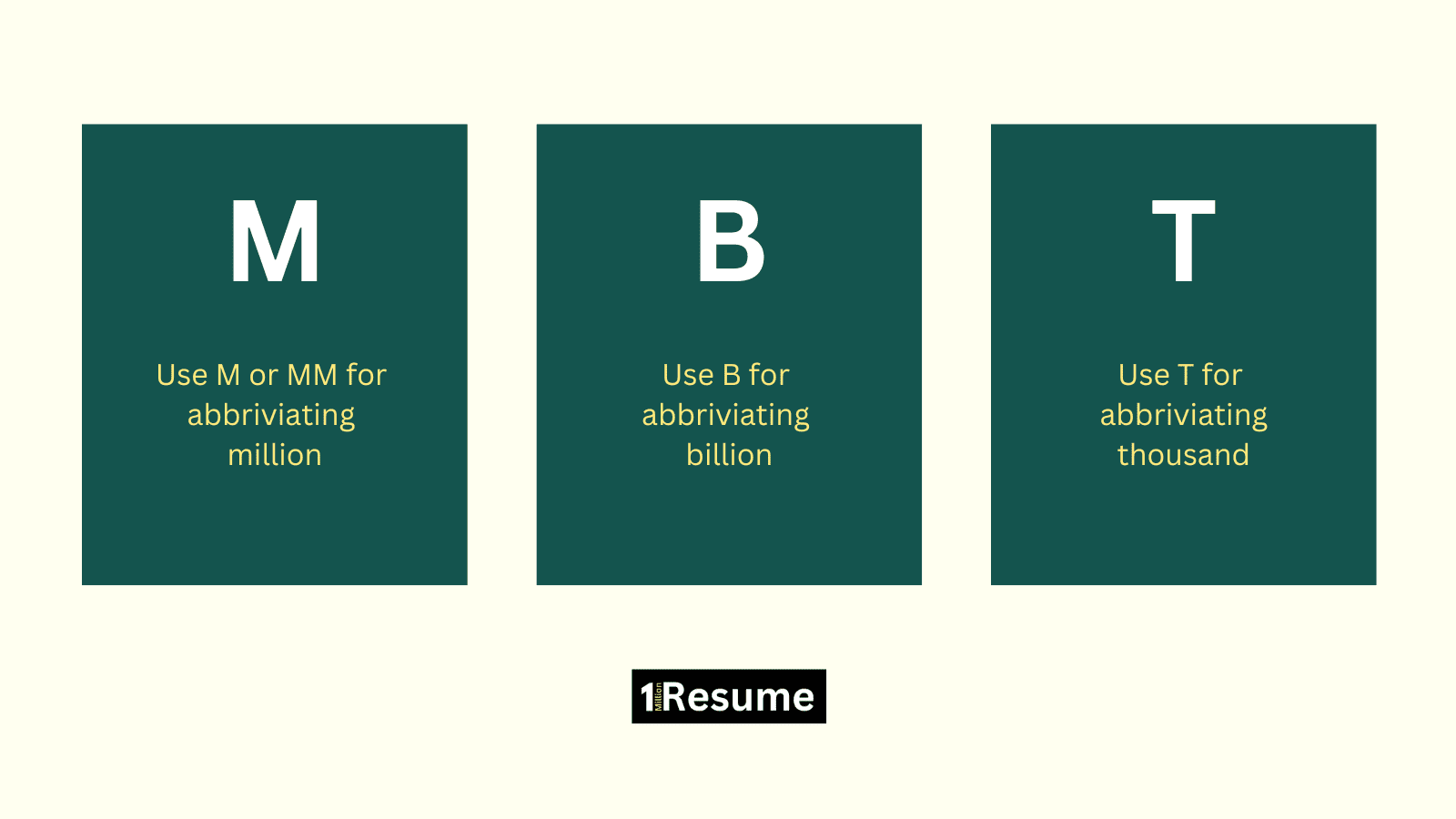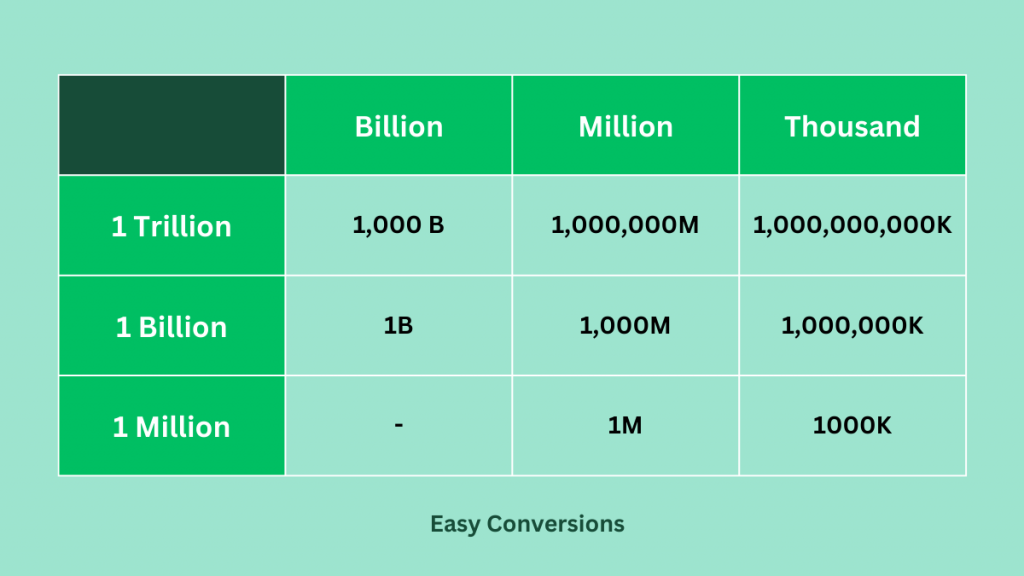Abbreviate for Million, Billion and Thousands on a Resume

Creating an impactful resume is crucial step in landing your desired job. One aspect that can significantly enhance your resume’s effectiveness is the use of abbreviations. Abbreviations help save space, improve readability, and present your information in a professional manner. In this article you will learn how to effectively abbreviate large numbers like thousands, million, billion and trillion to make your achievements stand out without overwhelming the reader.
By end of this you”ll know
Understanding abbreviations
let’s dive into what are these abbreviations and and why they are used
What are abbreviations
In the professional world, numbers play a crucial role in showcasing your achievements.
Abbreviations are shortened forms of words or phrases used to save space and simplify communication. On a resume, abbreviations are especially useful for conveying large numbers concisely.
| Number | General Abbreviation | Financial Abbreviation | Resume Abbreviation |
|---|---|---|---|
| 1,000 | K | K | K |
| 1,000,000 | M | MM | M |
| 1,000,000,000 | B | Bn | B |
Commonly Used Abbreviations on Resumes include
- K for thousand
- M for million
- B for billion
The Importance of Abbreviations on a Resume
Before diving into the specifics, it’s essential to understand why abbreviations are vital on a resume:
- Conciseness: Resumes are typically scanned quickly. Abbreviations ensure your achievements are easily digestible.
- Clarity: Proper abbreviations prevent misinterpretation of figures.
- Professionalism: Using standard abbreviations reflects a knowledge of business norms.
How to abbreviate large numbers
Abbreviations are very frequently used in finance, marketing and sales, technology and engineering and here is how you do it
- Thousand: Typically abbreviated as “K” (from the Greek word “kilo”). For example, 5,000 can be written as 5K.
- Million: Abbreviated as “M” For instance, $10,000,000 becomes $10M.
- Billion: Abbreviated as “B” So, $1,000,000,000 is represented as $1B.
- Trillion: Abbreviated as ‘T‘ so, $1,000,000,000,000 is represented as $1T
Abbreviating Thousands
Common Abbreviations for Thousands
The most common abbreviation for thousand is “K.” For example, 1,000 becomes 1K.
Examples of Using Thousands on a Resume
- Managed a budget of $50K for marketing campaigns.
- Increased sales by 20K units in the first quarter.
Abbreviating Millions
Common Abbreviations for Millions
“Million” is commonly abbreviated as “M.” For example, 1,000,000 becomes 1M.
Examples of Using Millions on a Resume
- Generated $2M in annual revenue.
- Supervised a team responsible for $5M in project funds.
Abbreviating Billions
Common Abbreviations for Billions
“Billion” is abbreviated as “B.” For instance, 1,000,000,000 becomes 1B
Example of using Billions on a Resume
- Managed a $2.5B investment portfolio, optimizing asset allocation and increasing annual returns by 15%.
Abbreviating Trillions
“Trillion” is commonly abbreviated as “T.” For example, 1,000,000,000,000 becomes 1T.
Example of using Trillion on a Resume
- Developed a data pipeline processing 2 trillion records monthly, reducing query execution time by 40%.
Conversions to Remember
1 Billion = 1,000 Million
1 Trillion = 1,000 Billion
1 Million = 1,000 Thousand

Tips for Abbreviating Numbers on Your Resume
- Consistency is Key: Whichever abbreviation style you choose, ensure it’s consistent throughout your resume.
- Avoid Mixing Formats: If you’re abbreviating millions as “M,” don’t write thousands in full. Stick to one format.
- Use Whole Numbers When Possible: Instead of writing $10.5M, consider rounding it to $11M for simplicity.
- Context Matters: Ensure that the context makes it clear what the abbreviation represents. For instance, “Managed a team of 5K” might be confusing, whereas “Oversaw a budget of $5K” is clearer.
Common Scenarios and How to Abbreviate
- Sales and Revenue: If you increased sales from $1,000,000 to $5,000,000, you could write it as “Boosted sales from $1M to $5M.”
- Budget Management: Managed a budget of $500,000? Simply put it as “Managed a budget of $500K.”
- Audience and Users: If your marketing campaign reached 1,000,000 users, state “Reached 1M users.”
Common Mistakes to Avoid
- Over-Abbreviation: While abbreviating is useful, avoid doing it excessively. It can make your resume challenging to understand.
- Misinterpretation: Ensure that your abbreviations can’t be misunderstood. For instance, “K” in the business world typically means thousand, but in other contexts, it might represent a kilobyte.
- Overloading with Numbers: While quantifying achievements is essential, your resume shouldn’t just be a list of numbers. Balance it with qualitative achievements.
Global differences in Abbreviations
It’s worth noting that abbreviations can vary across cultures. For instance, some European countries use “M” to denote thousand (from the Latin “mille”). If you’re applying for a position in a different country, it’s worth familiarizing yourself with local norms.
Conclusion
Abbreviating large numbers on your resume can make your achievements stand out in a clear, concise manner. By following the guidelines above, you can ensure that your resume is both impactful and professional. Abbreviations are very common in sales, marketing, finance and engineering industries. Remember, the goal is to communicate your accomplishments effectively, and the right abbreviations can help you do just that.
Frequently Asked Questions
Can I use “mil” to abbreviate million on my resume?
- While “mil” is sometimes used in casual settings, it’s best to stick with the more universally recognized “M” on a professional document like a resume.
Should I always abbreviate numbers on my resume?
- Not necessarily. If a number is central to an achievement and space allows, you might choose to write it out. Use your judgment.
Are there industries where abbreviations are discouraged?
- Some industries, like academia, might prefer numbers written out, especially if they’re not excessively large. Always tailor your resume to the industry and role you’re applying for.
How do you abbreviate million on a resume?
Use “M” for million (e.g., $5M for $5,000,000). In finance, “MM” is sometimes used.
How do you abbreviate billion?
Use “B” for billion (e.g., $3B for $3,000,000,000).
What is the abbreviation for thousand?
The most common abbreviation is “K” (e.g., $50K for $50,000).
Author – Kunal Saxena
Kunal is a seasoned Technical Resume Writer with over 13 years of experience working with startups, mid-sized firms, and top global companies like Goldman Sachs and EY. He brings deep domain expertise across tech, education, insurance, e-commerce, and investment banking.
He has helped hundreds of professionals from top firms—including Apple, Meta, Google, Adobe, and Amazon — land interviews and advance their careers globally. His approach blends real-world hiring insight with high-impact resume strategy.
Kunal is an active member of Career Thought Leaders and the Resume Writing Academy, staying current with global resume trends and recruiter expectations.
Connect on LinkedIn
Amit got 2 Offers with our resume builder

My experience was truly outstanding, I got 3-5 interview calls and 2 job offers. The resume wasn't just focused on my current job - it captured my consulting, technical and leadership skills as well. Plus this was much more affordable
Data Engineer - Deloitte


